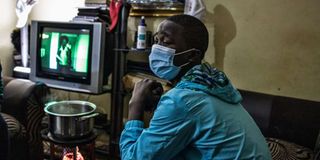Premium
Manhood must wait: virus delays South African circumcision rituals

Sinoyolo, 17, who is waiting to undergo male initiation that marks a boy's transition into adulthood, poses for a portrait in Kwazakhele, Port Elizabeth, on July 11, 2020.
What you need to know:
- Every year, initiates aged between 15 and 17 spend at least three weeks secluded in the bush, where they are circumcised and taught to be responsible men.
- These secretive rites of passage typically take place in June and December.
- But this year, for the first time in living memory, the ritual has been called off because of the coronavirus.s.
Port Elizabeth
South African 17-year-old Sinoyolo was looking forward to becoming a "man" this year.
His uncle had made arrangements for him to travel to the mountains overlooking the South African city of Port Elizabeth in December for his initiation.
Known in the local Xhosa language as "Ukwaluko", the secretive rite of passage marks a boy's transition into adulthood.
Boys to men
Every June and December thousands of initiates between 15 and 17 years old spend at least three weeks secluded in the bush, where they are circumcised and taught to be responsible men.
But this year, for the first time in living memory, the ritual has been called off because of the coronavirus.
"If we send them there and find that one boy is positive (for the virus), it means all 20 of them will be infected," said Afra Msutu, a Xhosa chief.
"When you go to the mountains and get circumcised, for the first seven days you are very vulnerable," he added, noting that initiates stay in close quarters with access only to a traditional doctor.
"We decided it would be too risky and that we might lose more boys than we usually do," Msutu said, referring to the fact that dozens of initiates nationwide die from botched circumcisions each year.
Most of the fatalities occur at the hands of unqualified organisers who fail to provide proper care, leading to dehydration and infection.
Scared
Sinoyolo, whose full name has not been disclosed to protect his identity, admitted to the misgivings he had felt over his Ukwaluko.
"I was a little bit scared because most of the guys who went to the mountain said it was very hard there," Sinoyolo said in the Port Elizabeth township of Kwazakhele, where he grew up.
"I think it's a good idea to put it on pause for now because this virus is strong, it has killed many people."
The Congress of Traditional Leaders of South Africa suspended June initiations in April, around one month after the country went into lockdown.
Msutu said that "unprecedented" decision was later extended to the whole year after it became clear the pandemic would last months.
South Africa has the world's fifth highest number of coronavirus infections, with more than 568,000 confirmed cases and at least 11,000 deaths.
Msutu noted that interrupting an initiation session because of a coronavirus outbreak would be humiliating for the boys.
"When you are up in the mountain you are not supposed to come back (early) even if you are sick," he said.
"We did not want to risk the community calling our 2020 boys 'weak' because they did not finish."
Sinoyolo agreed, nodding vigorously at the chief's words.
True man
For him, the fear of not being recognised as a "true man" justified the wait and trumped any concern about pain.
"It's our traditional thing," Sinoyolo said, eyes shining at the thought of finally being treated as an adult.
"Fathers don't like sitting with you until you are circumcised... they keep you apart," he said.
"The older guys are also doing things you are not doing and calling you childish, so I want to upgrade my level."
Sinoyolo said he would use the extra time to "think" and mentally prepare for the challenge ahead.
Chief Msutu, 42, was dismayed over the postponements.
"When I talk to my fathers, the elders, no one has ever experienced anything like this," he said. "Everyone is shocked."
But he noted that the decision to suspend Ukwaluko had been unanimous.
"As much as it is exciting to go to the mountains," he said, "the vital point is that you must come back alive."





